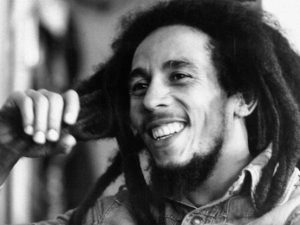A History of Jewish People in Jamaica, Part I


Pictures shown: Bob and Rita Marley. Bob Marley had a Syrian Jew in his ancestry, and was also a devoted Rastafari. Rastafari worship Haile Selassie I ( who was an Ethiopian Jewish Emperor who ruled from 1916 to 1974 ) as the incarnation of Jah, or God, on Earth. They also have as their symbol the Lion of Judah, and they observe kosher laws. The Rastafari, including Bob Marley, are basically Jewish as well.
( Cross-posted from Jahmakeyah.com )
Rastafarianism developed in Jamaica in the 1930s. Rastafarians regard Haile Selassie I as the second coming of Christ as was foretold in the Old Testament ( for example, Zechariah 9:14–15; 12:10–14; 13:1 ). Haile Selassie I was a member of the Solomonic dynasty, the former ruling Imperial House of the Ethiopian Empire. They were descended from King Solomon and Queen Sheba, as well as from Abraham who was the common patriarch for Judaism, Christianity, and Islam.

Jewish people of European descent are generally thought to have been a part of Jamaica’s history since 1655 when the British took over from the Spanish. Many sources point to the existence of gravestones in Jamaica indicating that Jews were coming to Jamaica as early as 1494 to escape religious intolerance in Spain and Portugal. Jamaica is considered by many to be the first country to have welcomed Jewish settlers in the Western Hemisphere.

Worshipers at Jewish Synagogue on Duke St, Kingston
While there was a strong sense of isolated identity and community among the first Jewish settlers and their descendants, they also intermingled and embraced the rest of the Jamaican population, so that many Jamaicans also have some Jewish roots. There was a tendency early on for the Jamaican Jews to keep significant parts ( if not most ) of their wealth in the Jewish community here and to send money back to family in Europe. Many of us have been to Devon House where Jamaica’s first Black millionaire, George Stiebel, lived after building it in 1881. George Stiebel got his start with money from his Jewish father. which he used to buy a ship to start a cargo business, and later branched out to several different business ventures and by 1873 he was making huge profits trading gold in Venezuela.
In addition to investing in property in Jamaica ( he owned 99 properties because the legal limit was 100 at the time ), Stiebel was a philanthropist, assisting the poor and disadvantaged, as well as exhibiting continuous interest in the socio-economic state of the country.


Devon House
In earlier times, the Jewish immigrants from Spain and Portugal thought more in terms of being separate from the Jamaican community. In 1724 Rachel Nunes requested that she be “decently buried in the burial place appointed for my nation the Jews in Leguenea
in the parish of St. Andrews,” for example. This isolated community focus and solidarity, is quite evident in the wills of Jamaican
Jews, where charity was extended only to Jewish entities ( with only 1 noted .exception, the will of David Bravo ).
Over time, however, the Jewish population joined the Jamaican community more and more, until today it is estimated that some 424,000 Jamaicans have a Jewish immigrant from Spain or Portugal in their family tree, while the number of more isolated religiously practicing Jews is believed to have gone from an earlier figure of 2,500 to something like 200 today.


An article in tabletmag.com includes an account of a party in 2014 for the community at the Bamboo Beach Club in Ocho Rios, “Chanukah in the Sand,” hosted by Chabad of Jamaica, which opened in July 2014 in Montego Bay, right by the main hotel strip. About 50 people attended, partaking in a meal of Jamaican jerk chicken. The hotel’s kitchen was kashered ( made kosher ) for the occasion. Kids played in the water, and an 8-foot-tall, custom-designed bamboo hanukkiah was lit. The party attracted a mix of locals, tourists, and expatriate Jewish-Jamaicans.
Noting a few more Jewish contributions and influences in Jamaica:

In 1833 Jacob and Joshua de Cordova established the Gleaner Company Ltd. ( now 1834 Investment Limited ), which publishes The Gleaner and an evening tabloid, The Star. Overseas weekly editions are published in Canada, the United Kingdom and the United States. Jacob de Cordova also went on to found the city of Waco, Texas in the United States.

Joseph Matalon is the chairman of the ICD Group, a Jamaican investment holding firm, which owns the British Caribbean Insurance Company. He also served on the executive committee of the Private Sector Organisation of Jamaica for many years, including three years as president. PSOJ seeks to influence national policy issues of a political, social, or economic nature by promoting discussions with the country’s government, political directorate and the opposition.
Additionally, Mr. Matalon is:
– A former chairman of the Development Bank of Jamaica.
– A director of RJRGLEANER Communications Group following the recent merger of RJR and The Gleaner Company (Media).
– And a former director of the Bank of Nova Scotia (Jamaica Limited).

The Rothschild Family ( international ), which is the subject of conspiracy theories, is thought by many to own or control several Central Banks that decide monetary policies for most countries in the world, including Jamaica ( Bank of Jamaica ), the United States ( Federal Reserve Bank ), European Union, Canada, France, Spain, Portugal, Japan, Haiti, Dominican Republic, Trinidad & Tobago, Belize, Cuba, Mexico, Brazil, Egypt, Ethiopia, Ghana, Nigeria, South Africa, Russia, Singapore, and several others. By 2011, only 3 countries were reportedly without a Rothschild-owned-or-controlled Central Bank: Cuba, North Korea, and Iran ( Cuba’s Central Bank has taken over many of the functions of the National Bank of Cuba, which was its “Central Bank” ).
Fantastic conspiracy madness? Well….. If you look further, the Bank of Jamaica sets monetary policy for Jamaica and supervises, licenses and regulates any financial institution that takes deposits. It was established in 1960 by the Bank of Jamaica Law, replacing the previous Currency Board System which didn’t have the same capabilities in terms of managing monetary policies and financial institutions. But what about the question of who controls the bank?

Looking at the Bank of Jamaica’s Constitution, yes it was created as a corporate body which would open up the question of who owns those shares, BUT… the shares are wholly owned by the government today. Also, the bank’s Governor, Senior Deputy Governor, and other Deputy Governors are to be appointed by the Prime Minister and can be appointed by the Governor-General ( on some unimaginably rare occasion where it became worth the political fallout that would almost certainly ensue ). I don’t see any loss of governmental control there. There would be more areas to research to look for possibilities of systemic foreign gain ( such as clearinghouse functions and regulation of foreign assets, etc ). I’ve only researched this for a little more than a week, but so far at least, I don’t see any evidence at all of a non-government organization running the Jamaican economy for their own profit through the Bank of Jamaica. So far, the conspiracy theories must be about central banks somewhere else — not the Bank of Jamaica.
Ok! So we’ve looked at the historical tendencies of those within the Jewish community to build up their wealth within the family, and we’ve that wealth later distribute itself to some level through intermarriage with Jamaicans ( non-Jewish Jamaicans ). Then we saw the example of one of the most prominent Jewish Jamaicans and several of his contributions in various banks and financial institutions in Jamaica. We looked for, but did not see, evidence to confirm the suspicions about a worldwide Jewish family controlling monetary policy through the central banks. Jamaica doesn’t seem to have that problem.
So what does all this history add up to? It all adds up to where we are today! And when we look at today, we’re looking at good news. Jamaica’s financial situation — and the prospects for the quality of life enjoyed by Jamaicans as a whole — is truly getting better!!

It’s still in the early stages, but the interest rates that the Bank of Jamaica is responsible for, have gone from a very bad 30% in 1998 to only 2.8% in February of this year! Please note, that is not such a bad number compared with countries all over the world in general. The economy is much, much healthier and this is great news for growth, jobs, and quality of life for all Jamaicans. If the interest rate going lower is combined with banks cutting their interest rates as well, you should expect to see increased spending and investment, higher AD ( aggregate demand ), economic growth, and an increase in GDP — Jamaicans will have more money in general. There would also be an increase in inflation. Those who own homes would see their value go up faster year after year. In March 2018 Jamaica’s inflation rate was put at 3.9%. If it goes to 7% for example, a house worth J $20 million could be worth $38 million after 10 years, $76 million after 20 years. ( Yes other prices would go up, and salary as well in the absence of other factors, but percentage paid on any fixed-rate mortgage would be going down, and for most people, because that would be a significant part of the budget, it would become a HUGE percentage increase in disposable income — income after all regular expenses are paid ).
The current 2.8% interest rate on borrowing money from the Bank of Jamaica also means that, if you have a $100,000 JMD balance ( $800 USD ) on your credit card for example, and if you didn’t pay money on it all year ( if your bank would allow that, Hahaha ), then at the end of the year your balance would only go up to 102,800 plus whatever money your bank charges you over the Central Bank rate. So maybe…. $106,000 JMD? $110,000 JMD? $160,000 JMD ( $1280 USD ) would be unexpected right? If your bank is paying the Bank of Jamaica $2,800 for that money, and the Bank of Jamaica has more money than you, then surely they’re not going to jack you up too much, right?
Well if you think they will, keep your eyes open for new banks starting up and charging lower interest rates as the economy gets better. Without 30% inflation holding us back, you’re going to see progress in Jamaica, I’m telling you that. If you see a need for new banks, and don’t see others starting them, sounds like you have a head for an MBA degree. Guh sign up nuh!

Anyway, there’s some history for you and a bonus. We hope you’ve enjoyed our show.
Coming next…. Nah, wi naa gu tell yuh! Yuh gwine hav fi keep lukin far it!
References:
https://en.wikipedia.org/wiki/Bob_Marley
https://www.smithsonianmag.com/travel/forgotten-jewish-pirates-jamaica-180959252/
https://en.wikipedia.org/wiki/Haile_Selassie
https://en.wikipedia.org/wiki/Solomonic_dynasty
https://www.gotquestions.org/second-advent-Messiah.html
https://en.wikipedia.org/wiki/History_of_the_Jews_in_Jamaica
http://www.jamaica-dream-vacation.com/devon-house-jamaica.html
https://en.wikipedia.org/wiki/Jews
http://jamaicans.com/jews-jamaica-long-history-three-firsts/
https://en.wikipedia.org/wiki/Gleaner_Company
http://americanjewisharchives.org/publications/journal/PDF/1989_41_01_00_august.pdf
http://www.tabletmag.com/scroll/187933/hanukkah-in-jamaica
http://jamaicans.com/richest-influential-people-jamaica/
https://psoj.org/about-us/
https://www.quora.com/Why-does-Rothschild-control-and-own-so-many-banks-in-dozens-of-countries
https://www.lightonconspiracies.com/only-three-countries-left-without-a-rothschild-central-bank/
https://en.wikipedia.org/wiki/Banking_in_Cuba
https://en.wikipedia.org/wiki/Bank_of_Jamaica
https://photius.com/countries/jamaica/economy/jamaica_economy_banking.html
http://boj.org.jm/financial_sys/supervised_legislation.php
https://tradingeconomics.com/jamaica/interest-rate
https://www.economicshelp.org/blog/3417/interest-rates/effect-of-lower-interest-rates/
http://www.boj.org.jm/bank/bank_faqs.php
http://www.global-rates.com/interest-rates/central-banks/central-banks.aspx


I did not know any of this! A good read!